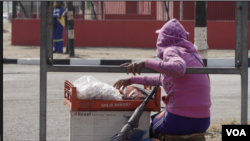Zimbabwe's deteriorating economy is forcing many families to put their children to work. Child rights activists say an increasing number of children are selling items on the street to supplement the family income.
On a busy corner, a 16-year-old we shall call Tribunal sells wares. Tribunal said this has been her story for the past two years since her mother died and she dropped out of school. She now lives with her 22-year-old sister. She said she gets about $5 a day in sales.
Tribunal said she actually wishes for a decent life and does not want to sell stuff here, but that she felt she could not force her father to pay her school fees because he is no longer employed. Tribunal said her father is even failing to pay fees for her 12-year-old brother, which she is now doing. She said she hopes her brother makes it in life.
On Thursday, Health and Child Welfare Minister Obadiah Moyo said President Emmerson Mnangagwa's government was aware of the plight of Tribunal and other children. He said Harare was working with organizations like UNICEF and other rights groups to remedy the situation.
Ratidzai Moyo, a program manager at children's rights group Childline Zimbabwe, said her organization has noted an increase in the number of youngsters being forced into working to survive as the economic situation deteriorates.
"But now with the economic challenge, with one community where a child has to sell maputi [roasted corn], for example, and they don't bring any income because nobody bought from them, then the parent rewards those who sold, with food. And the one who did not sell, you didn't bring any money home, how do you expect to eat? So, we [are] now engaging parents that you should not punish children by withdrawing food. Yes, things are hard, and it would be hard to do if it is something they have to do after school. So, they won't be able to sell anything," said Moyo.
The economic turmoil is blamed for a rise in political tensions in the African nation. Anti-government protests are scheduled for Friday. The government has threatened to stop the demonstrations.





